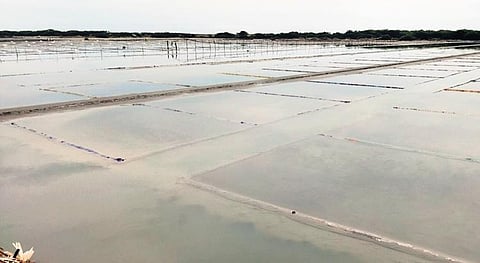

NAGAPATTINAM: As the world observed May Day on Monday, salterns in Vedaranyam wore a look of uncertainty after last week's unseasonal rains affected salt production in around 9,000 acres. The salterns are now inundated with rainwater, making it difficult to produce salt. The salterns were just approaching peak production season when the rains played spoilsport.
"We are waiting for the sun to shine again. It usually takes four to ten days to resume salt production once the rains stop. The waters in salterns take time to drain," said P Dhanyakumar, a small-scale salt producer from Agasthiyampalli. Salt production takes place in the Vedaranyam block under the sun on around 9,000 acres, of which two corporate companies produce salt on about 6,000 acres, and a thousand small-scale producers work on around 3,000 acres, employing around 20,000 workers.
The small-scale production takes place in villages like Agasthiyampalli, Kailavanampettai, Kadinalvayal, Kodiyakadu and Kodiyakarai. Production begins late in February during the spring and is complete by early October ahead of the monsoon. The period between April-June is usually the time when production intensifies. The salt produced in Vedaranyam is transported to districts across Tamil Nadu and other states in south India.
Currently, the produced salt is also stagnant as they are kept covered to avoid rain exposure. Last week's rains have also dented labour works. The women earn `350 per day for work like scrapping and shovelling and men earn `450 per day for work like heaping and loading onto vehicles.
"It is hard for my husband to go fishing on rainy days. We cannot go for the 100-day work scheme under the MGNREGS either, as they are also fewer on rainy days. It becomes difficult to make ends meet," said R Selvi, a daily wage worker at a saltern at Kodiyakadu.